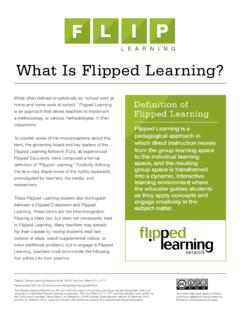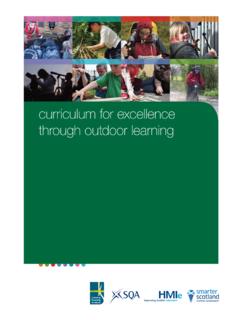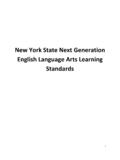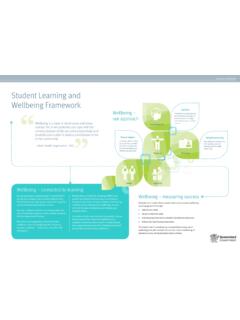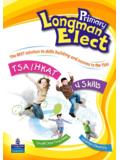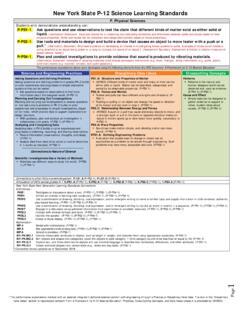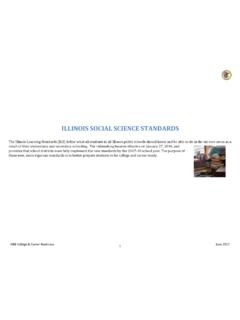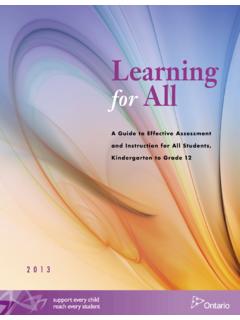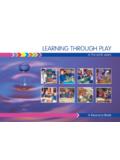Transcription of The Positive Impact of Social and Emotional Learning for ...
1 John PaytonRoger P. WeissbergJoseph A. DurlakAllison B. DymnickiRebecca D. TaylorKriston B. SchellingerMolly Pachan Findings fromThree Scientifi c ReviewsTechnical Report Collaborative for Academic, Social , and Emotional Learning (CASEL) December 2008 The Positive Impact of Social and Emotional Learning for Kindergarten to Eighth-Grade StudentsAcknowledgments: This report is supported by grants awarded to Roger P. Weissberg and Joseph A. Dur-lak by the Lucile Packard Foundation for Children s Health and the University of Illinois at citation: Payton, J., Weissberg, , Durlak, , Dymnicki, , Taylor, , Schellinger, , & Pachan, M. (2008). The Positive Impact of Social and Emotional Learning for kindergarten to eighth-grade students: Findings from three scientifi c reviews.
2 Chicago, IL: Collaborative for Academic, Social , and Emotional technical report and an Executive Summary on the three reviews may be retrieved from or questions about these studies or related work may be addressed to:Roger P. Weissberg, PhD Joseph A. Durlak, PhDDepartment of Psychology (MC 285) Department of PsychologyUniversity of Illinois at Chicago Loyola University Chicago1007 West Harrison Street 6525 N. Sheridan RoadChicago, IL 60607-7137 Chicago, IL 60626 Email: Email: John Payton, Roger P. Weissberg, Allison B. Dymnicki, and Rebecca D. Taylor are based at the University of Illinois at Chicago and affi liated with the Collaborative for Academic, Social , and Emotional Learning (CASEL).
3 Joseph A. Durlak, Kriston B. Schellinger, and Molly Pachan are affi liated with Loyola University image: Andreea SpyropoulosDocument design: Desktop Edit Shop, Inc., Skokie, Illinois Collaborative for Academic, Social , and Emotional Learning December 20082 Table of ContentsAcknowledgments .. 2 Table of Contents .. 3 List of Tables .. 3 Abstract .. 4 Introduction .. 5 Overview of Three Reviews .. 7 Methods .. 9 Results .. 12 Discussion .. 16 Appendix A: Bibliography of Reviewed Universal Studies .. 33 Appendix B: Bibliography of Reviewed Indicated Studies .. 42 Appendix C: Bibliography of Reviewed After-School Studies ..46 References .. 49 List of TablesTable 1 Descriptive Characteristics of 180 Studies with Outcomes at Post in the Universal Review.
4 19 Table 2 Student Outcomes Obtained at Post and Follow-up in 180 Studies in the Universal Review .. 22 Table 3 Comparison of the Magnitude of Student Change at Post in 180 Studies in the UniversalReview with Outcomes in Previous Meta-analytic Reviews .. 22 Table 4 Student Outcomes Obtained at Post in 180 Studies in the Universal Review in ProgramsUsing and Not Using Evidence-based (SAFE) Training Practices .. 23 Table 5 Student Outcomes Obtained at Post in 180 Studies in the Universal Reviewby Reported Program Implementation Problems .. 24 Table 6 Student Outcomes Obtained at Post in 180 Studies in the Universal Reviewby Program Delivery Format .. 25 Table 7 Descriptive Characteristics of 80 School-Based Studies with Outcomes at Postin the Indicated Review.
5 26 Table 8 Student Outcomes Obtained at Post and Follow-up in 80 Studies in the Indicated Review .. 29 Table 9 Student Outcomes Obtained at Post in 80 Studies in the Indicated Reviewby Presenting Problem, Program Deliverer, and Implementation Monitoring Status.. 29 Table 10 Descriptive Characteristics of 57 Studies in the After-School Review .. 30 Table 11 Student Outcomes at Post in 55 After-School Studies of SAFE and Other Programs .. 32 Table 12 Comparison of the Magnitude of Student Change Obtained at Post in 55 Studiesin the After-School Review with Outcomes in Previous Meta-analytic Reviews .. 32 The Positive Impact of Social and Emotional Learning for Kindergarten to 8th-Grade Students3 Collaborative for Academic, Social , and Emotional Learning December 20084 AbstractThis report summarizes results from three large-scale reviews of research on the Impact of Social and Emotional Learning (SEL) programs on elementary- and middle-school students that is, programs that seek to promote various Social and Emotional skills.
6 Collectively the three reviews included 317 studies and involved 324,303 programs yielded multiple benefi ts in each review and were effective in both school and after-school settings and for students with and without behavioral and Emotional problems. They were also effective across the K-8 grade range and for racially and ethnically diverse students from urban, rural, and suburban settings. SEL programs improved students Social - Emotional skills, attitudes about self and others, connection to school, Positive Social behavior, and academic performance; they also reduced students conduct problems and Emotional distress. Comparing results from these reviews to fi ndings obtained in reviews of interventions by other research teams suggests that SEL programs are among the most successful youth-development pro-grams offered to school-age youth.
7 Furthermore, school staff ( , teachers, student support staff) carried out SEL programs effectively, indicating that they can be incor-porated into routine educational practice. In addition, SEL programming improved students academic performance by 11 to 17 percentile points across the three re-views, indicating that they offer students a practical educational benefi t. Given these Positive fi ndings, we recommend that federal, state, and local policies and practices encourage the broad implementation of well-designed, evidence-based SEL programs during and after cannot always build the future for our youth, but we can build the youth for our future. Franklin D. RooseveltThe Positive Impact of Social and Emotional Learning for Kindergarten to 8th-Grade Students5 Research conducted during the past few decades indicates that Social and Emotional Learning programming for elementary- and middle-school students is a very promising approach to reducing problem behaviors, promoting Positive adjustment, and enhancing academic rst century schools serve socio-culturally diverse students with varied abilities and motivations for Learning ( Learning First Alliance, 2001).
8 While some students are academically engaged and participate energetically in class and extracurricular activities, others are less engaged and achieve poorly (Blum & Libbey, 2004). Many students become more disengaged from school as they progress from elementary to middle to high school. It is estimated that 40 to 60% of urban, suburban, and rural high school students become chronically disengaged from school not counting those who have already dropped out (Klem & Connell, 2004). Ap-proximately 30% of high school students participate in or experience multiple high-risk behaviors ( , substance use, sex, violence, depression, attempted suicide) that interfere with school performance and jeopardize their potential for life success (Cen-ters for Disease Control and Prevention, 2008; Dryfoos, 1997).
9 Furthermore, large percentages of students lack Social - Emotional competence, believe their teachers do not care about them, and disrupt the educational experiences of classmates (Benson, Scales, Leffert, & Roehlkepartain, 1999).Preparing students for life success requires a broad, balanced education that both ensures their mastery of basic academic skills and also prepares them to become responsible adults (Association for Supervision and Curriculum Development, 2007). It is important for families, schools, and communities to identify and effectively implement research-based approaches that promote children s Social , Emotional , and academic engagement and growth in the early years of school. Research conducted during the past few decades indicates that Social and Emotional Learning (SEL) pro-gramming for elementary- and middle-school students is a very promising approach to reducing problem behaviors, promoting Positive adjustment, and enhancing aca-demic performance (Diekstra, 2008; Greenberg, Weissberg, O Brien, Zins, Fredericks, Resnik, & Elias, 2003; Wilson, Gottfredson, & Najaka, 2001; Weissberg, Kumpfer, & Seligman, 2003; Zins, Weissberg, Wang, & Walberg, 2004).
10 The purpose of this report is to summarize the primary fi ndings and implications of three large-scale reviews of research evaluating the Impact of SEL programs for school children in kindergarten through eighth Universal Review. This review examined the Impact of universal school-based SEL interventions: that is, interventions that are appropriate for a general student body without any identifi ed behavioral or Emotional prob-lems or diffi culties (Durlak, Weissberg, Dymnicki, Taylor, & Schellinger, 2008).2. Indicated Review. This review focused on school-based indicated pro-grams: that is, interventions that identify and work with students who are displaying early signs of behavioral or Emotional After-School Review. This review evaluated SEL interventions conduct-ed in after-school programs, which primarily involved students without identifi ed problems (Durlak, Weissberg, & Pachan, in press).










